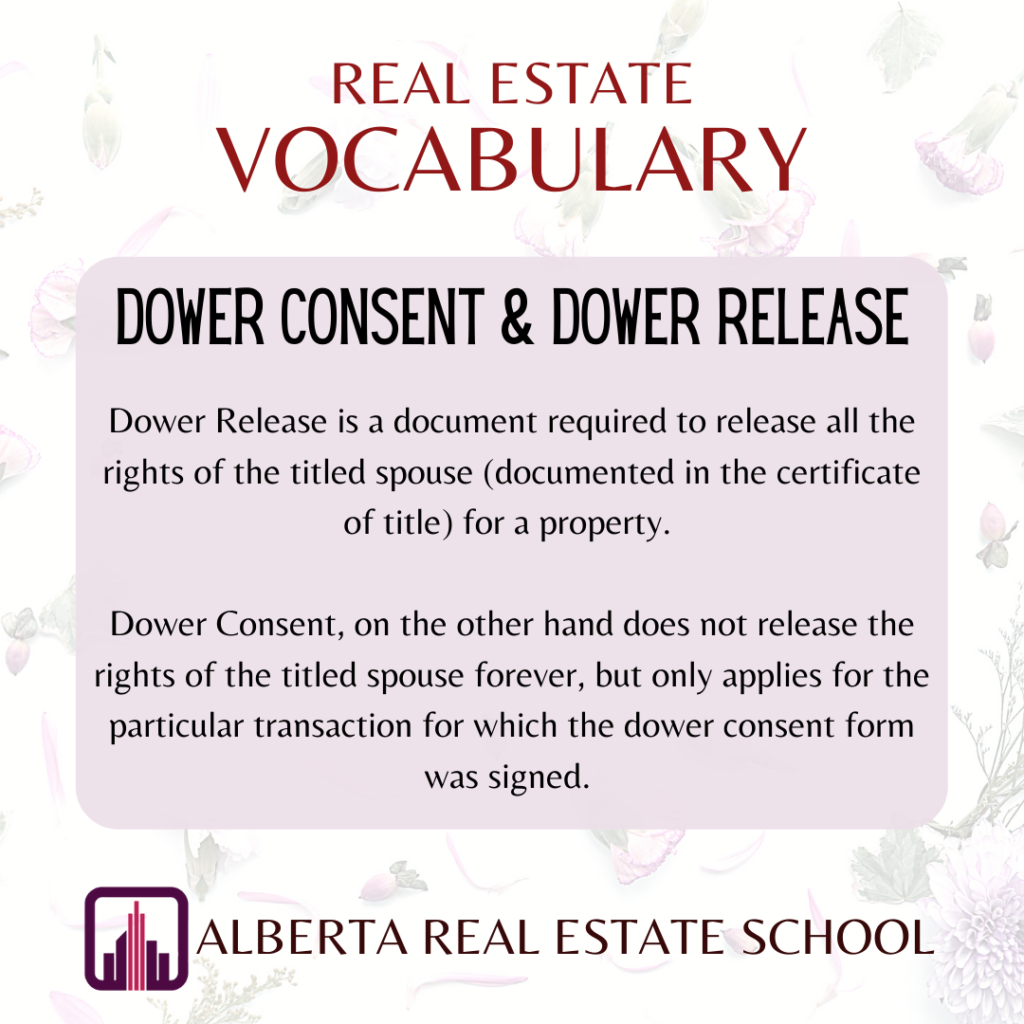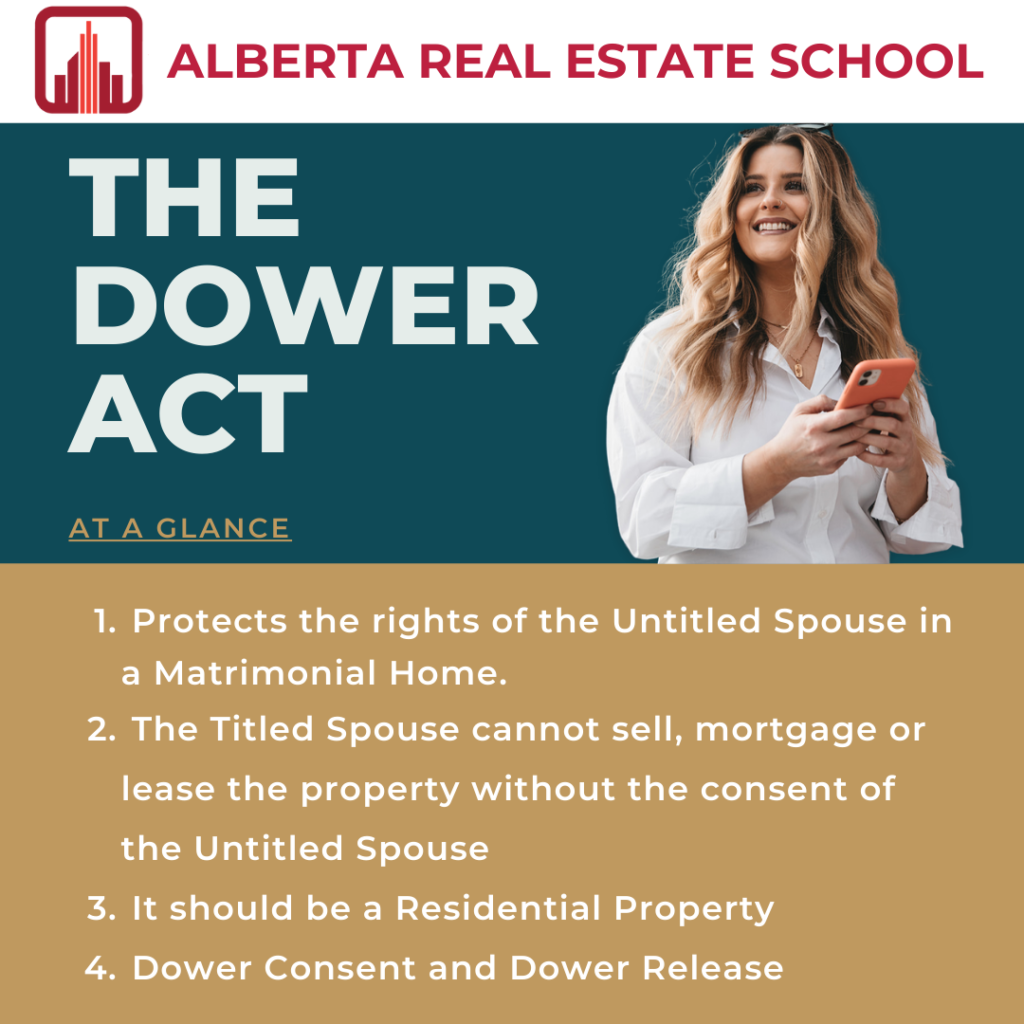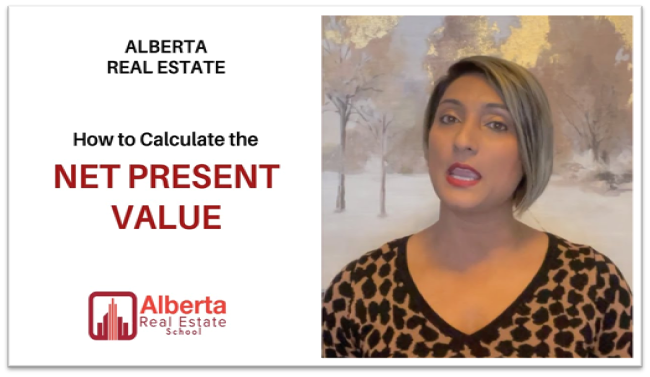Dower Act is something that all Realtors® are and should be aware of. It is one of the most important topics for all categories of Real Estate Exams. It is also an important topic for buyers to be aware of when it comes to purchasing a property. It deals with matrimonial homes. So basically, if you are married or about to be married, and if you are buying a property, dower act comes into action. This is a very general phenomenon that almost every individual deal within their lifetime.
You can also switch over to the video version below if you prefer watching over reading –
What is Dower Act?
We can define Dower Act as –
Dower Act protects the rights of the untitled spouse in a matrimonial home.
It means if there is one person on the title and that person is married, the rights of the other spouse that is not on the title will be protected with dower act. The title spouse i.e., the person who is listed on the Certificate of Title of the property will not be able to dispose off the property. In other words, they will not be able to sell, mortgage, or lease the property without the consent of the untitled spouse.
What does Dower Act offer?
In a situation where two people are married and only one person is on the title, they will not be able to sell the property without the consent of the second person who is not on the title. This act provides residential safety and security to the untitled spouse, so that they don’t get kicked out of the matrimonial house that they are living in by their common law or legally married partner. However, it is important to note that dower act only safeguards the rights of the spouse and not their children.
How can Dower Act protect you if your titled spouse dies?
You might be wondering, what will happen if the titled spouse dies? if the person who is on the title dies, it then creates a life estate for the untitled spouse in the property. This means that the untitled spouse will be able to use the property. They can then have the full control of the property. It is their right as they were directly related with their partner.
Dower Act offers concrete rights to the spouse that even if the titled spouse has a will, and he has nominated a different beneficiary in the will as the owner of the property after his death, dower can still overpower the will and come into effect, if the untitled spouse is still alive. Once the untitled spouse dies, the estate will then pass to whoever the fee simple owner of the property is. Basically, only then the beneficiary in the will (other than the untitled spouse) will be able to take charge of the property.
Requirements for Dower Act Application
In order to take the benefits of dower act, you need to have the following conditions fulfilled. Only then, dower can be applied –
- There should be only 1 spouse in the certificate of title of the property. The spouse should be untitled for the dower act to be applied.
- The titled spouse and untitled spouse should be legally married.
- Either of the spouses should have lived in the property after getting married. This is a very important point as for the dower act to apply, it should be made sure that the property is used as a living/residential space by at least one of the spouses. Only then dower act can protect the rights of living for the untitled spouse.
- It only applies to Residential Properties. The purpose of dower act is to protect the basic rights of retaining the personal residence of a married partner. Thus, it can be applied for residential properties only, and not for business/commercial properties.
Dower Consent and Dower Release
Dower Consent and Dower Release are documents required during the Dower Rights legislation in the Alberta Law. The Dower Act creates Dower rights.

The Dower Act Process
- See if all the requirements are met.
- Get the Dower Consent or the Dower Release signed by the untitled spouse
- If the spouse chooses to sign the dower consent form, the next step would be to add the real estate agent’s consent to the file to keep all the records.
- Finalize the deal and transfer the certificate of title on the name of the Untitled Spouse.
Key Takeaways from the Blog

Sample Exam Questions
Example 1 – Definition Question
Which of the following statements best describe the term Dower Act?
A. It protects the rights of the title spouse in the matrimonial home when there’s a soul owner on the certificate of title
B. It protects the rights of the untitled spouse in the matrimonial home when the property is held in joint tenancy option
C. It protects the rights of the untitled spouse in the matrimonial home when there is a sole owner on the certificate of title or
D. It protects the rights of the untitled spouse in the matrimonial home when property is held as tenants in common
Correct Answer: C
Rationale: Here, only Statement C states all the points that define the term Dower Act – untitled spouse, matrimonial home, sole owner on the certificate of title. Thus, the correct answer will be Statement C.
Example 2 – Scenario Question
John is a real estate professional with Prime Brokerage helping Sam and Melissa sell their home. On pulling the title for the property, John sees that Melissa is the sole owner of the property as she had purchased the place prior to their marriage. Which of the following statements apply in this situation?
A. Dower Act does not apply as Melissa had purchased the property prior to their marriage.
B. Dower Act does not apply as Sam and Melissa plan to use the property as a rental.
C. Melissa needs to sign a Dower Release and register it on the title of the property.
D. Sam will need to sign a Dower Consent, so Melissa can sell the property.
Correct Answer: D
Rationale: In this case, it doesn’t matter if the property was brought into the marriage or not. If one person had the property prior to the marriage and the person gets married and because either or both the spouses have lived in the property, Dower Act would apply. And thus, the untitled spouse would have to give consent in order for the property to be sold. Here, the untitled spouse would be Sam because Melissa owned the property prior to marriage. But because they’re living in this property right now, dower act will apply. Thus, the correct answer in this case would be Statement D. We would get Sam to sign the Dower Consent.
So, this is Dower Act for you. Learn the concept and all the related terms for Dower Act, when to apply the dower act and how the dower act process takes place. The sample questions should give you an idea about how to take on the topic in the real estate exams. We cover similar topics to make you understand the concept of the topic with relevant examples and practice questions to make your preparations robust.
Join Alberta Real Estate School for expert help with understanding the concepts of Real Estate and getting uncommon and detailed tutoring sessions personalized as per your needs. Get our personalized Notes designed to get you through the Real Estate Exams in the first attempt! Visit our list of Real Estate Tutoring Sessions for details.
If you have any doubts for Exam Preparation of any of the real estate courses or topics, reach out to us directly at 587.936.7779.
We hope you found this information useful. You can also listen to this blog on the Podcast Channel below. Stick to us for our latest updates.

















